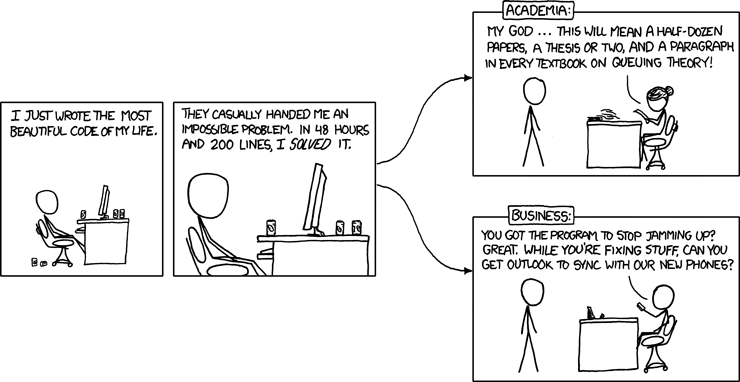 The Incredibles
The Incredibles is one of my favorite movies for numerous reasons. However, today
underscores how much reality lies within fiction. In the movie, Gilbert
Huph (see photo at right) is an insurance manager who supervises Bob Parr, a.k.a Mr. Incredible.
I am convinced that Gilbert
Huph has been cloned and installed throughout the insurance industry.
My family currently has no health insurance. We've been paying out of pocket through a cafeteria plan for the past couple of years since I changed jobs from a large employer to a small employer who merely gives a benefit allowance. Recently, my wife and I decided that time was running out for us and began to plan for another child. We decided to purchase an individual policy for the family, and decided against purchasing maternity insurance for numerous reasons. Still, we needed information to make an
informed decision about what was best for our family.
Here's where truth truly mirrors fiction. In the movie, the following exchange takes place between
Huph and Bob (dialogue courtesy of
Wikiqoute; find the exchange and others
here):
- Mr. Huph: I'm not happy, Bob. Not. Happy. Ask me why.
- Bob Parr: Okay. Why?
- Mr. Huph: Why what? Be specific, Bob.
- Bob Parr: Why are you unhappy?
- Mr. Huph: Your customers make me unhappy.
- Bob Parr: What, you've gotten complaints?
- Mr. Huph: Complaints I can handle. What I can't handle is your customers' inexplicable knowledge of lnsuricare's inner workings! These people are experts! Experts, Bob! Exploiting every loophole, dodging every obstacle! They're penetrating the bureaucracy!
- Bob Parr: Did I do something illegal?
- Mr. Huph: [reluctantly] No.
- Bob Parr: Are you saying we shouldn't help our customers?
- Mr. Huph: The law requires that I answer no.
- Bob Parr: We're supposed to help people.
- Mr. Huph: We're supposed to help our people! Starting with our stockholders, Bob! Who's helping them out, huh?!
Back to my reality.
When I left my large employer two years ago, I planned on re-insuring myself. However, I could
NEVER get a straight answer from
ANYONE regarding coverage specifics. Now, I understand each policy is different. I know that companies are reticent about making statements for legal reasons. I get that coverage can vary based on medical history. The problem remains there is
ZERO incentive for an insurance company to provide me
ANY information that regulation does not
ABSOLUTELY require. Consequently, I spent the better part of several months getting stonewalled at every turn, and therefore being under-covered.
After our renewed
commitment to get coverage, I went back on the trail. I finally got a lady at
Golden Rule, a subsidiary of
UnitedHealthCare, to answer my questions. She was very hesitant at first, but when I explained to her that I was likely going to use Golden Rule as my provider, but wanted to clarify some basic concepts about the type of plan I was choosing and general coverage provisions, she proceeded to answer virtually all of my questions and confirm my
lay person's translations of her answers.
Having spent time in customer service in a former life, I knew that the most valuable thing I could do to say thanks to the lady who helped me was report my
gratitude to her supervisor. So, I asked for the supervisor's name and phone number (since the supervisor wasn't present that day). However, as I've tried to call back, I
consistenly get shuttled around through some
labyrinthian phone system, where no one's what I'm talking about or volunteers to help me do something nice for someone in a much-maligned industry.
Am I penetrating the bureaucracy? Does that scare them? Does it have no value
because it doesn't serve the shareholders' needs?
Based on this, I'm supposed to feel good about a "private" solution to the health care coverage issue? Here's the problem with that: insurance is not a "free market". The policy underwriters do not want to expose themselves, the claims adjusters do not want to cover claims, the legal teams may value calculations about when to pay "go away" money, and there is zero incentive to treat the customer well, especially over the long run (because the longer you're a customer, the more costly your claims are likely to become).
Golden Rule/United, if I weren't a captive, there's no way I'd do business with you. It blows my mind that the same groups that scream "free market solutions" and "let the market decide" are the same firms, the same lobbies, the same industries that hide behind the regulations that prevent free markets from functioning as such. Please just be transparent so that this great free market full of rational actors can make informed decisions. Unless, of course, your great fear is that no rational actor, given any viable alternative, would choose you.




 Even though I waffle at times, when asked about my favorite band, I generally have to answer
Even though I waffle at times, when asked about my favorite band, I generally have to answer 





